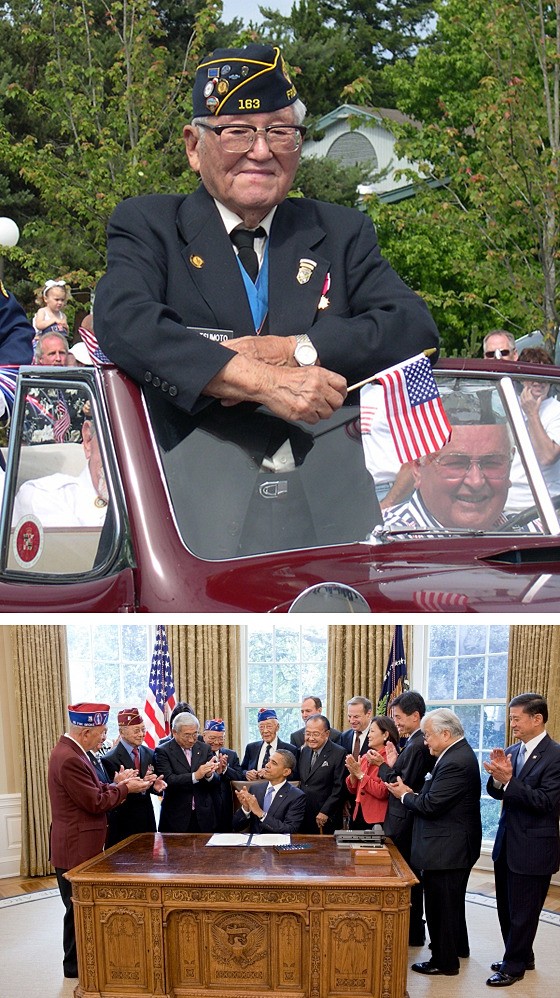Like thousands of other Nisei sent to internment camps during World War II, Roy Matsumoto was American-born and eager to prove his loyalty to his country.
The White House estimates 6,000 Nisei — or Japanese Americans born here to immigrant parents — served in battle in the 100th Infantry Battalion, the 442nd Regimental Combat Team and the Military Intelligence Service. Matsumoto and others in the MIS “intercepted radio transmissions, translated enemy documents, interrogated enemy prisoners of war, volunteered for reconnaissance and covert intelligence missions, and persuaded enemy combatants to surrender.”
Military honors the 100th, the 442nd and the MIS received include seven Presidential Unit Citations, 21 Medals of Honor, 29 Distinguished Service Crosses, 560 Silver Stars, 4,000 Bronze Stars, 22 Legion of Merit Medals, 15 Soldier’s Medals and more than 4,000 Purple Hearts.
Now, the 100th, 442nd and the MIS have received the highest civilian honor presented by the United States of America: the Congressional Gold Medal.
On Oct. 5, President Obama signed into law S.1055, a bill to grant the Congressional Gold Medal to the 100th, 442nd and the MIS. One gold medal will be issued; individual honorees will receive bronze duplicates. Present at the signing were Medal of Honor recipient Daniel Inouye, U.S. senator from Hawaii, and other veterans of the 442nd Regimental Combat Team.
For Matsumoto, the gold medal is validation of his “American patriotism” and helps erase the pain of having been classified an “enemy alien” and shuttled to a camp because of his Japanese ancestry.
Matsumoto, a San Juan Island resident who retired from the Army and earned induction into the Ranger Hall of the Fame and the Military Intelligence Hall of Fame, said he and other veterans have received numerous honors from organizations. But the Congressional Gold Medal “shows that Congress appreciates what we have done. This honor is from the nation,” he said. He noted that legislation authorizing the medal was approved by Congress without dissent.
Christine Sato Yamazaki, chairwoman of the National Veterans Network, blogged, “All members and families of the 100, 442 and MIS and the Japanese American community are deeply grateful and humbled to receive the highest civilian honor Congress can bestow on an individual or group.” She expects the presentation will be made in summer or fall 2011, and said the date will be announced by the Speaker of the House.
The Congressional Gold Medal was first awarded by the Continental Congress to George Washington in 1776. Other prominent honorees include the Wright Brothers, civil rights pioneer Rosa Parks, the Navajo Code Talkers, the Tuskegee Airmen and the Dalai Lama.
Matsumoto is believed to be the second San Juan Island resident to receive the Congressional Gold Medal. On March 10, Penelope Peirce Garrett (1922-2002) received the medal posthumously in recognition of her service as a military pilot in World War II. U.S. Navy Midshipman Caitlin Ness of Friday Harbor, who is now an ensign, attended the ceremony on behalf of the Garrett family.
Penelope Garrett is the mother of Gail Garrett of Friday Harbor.



